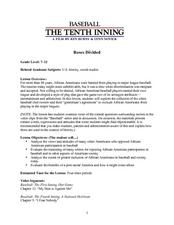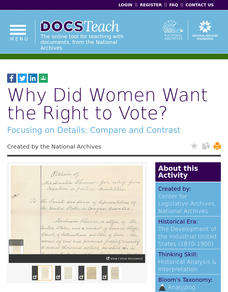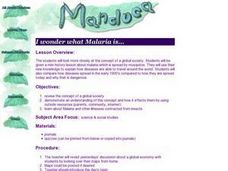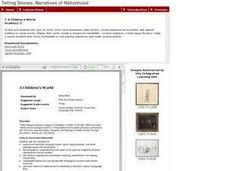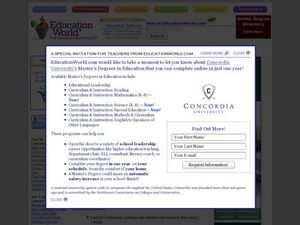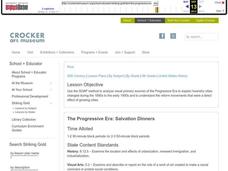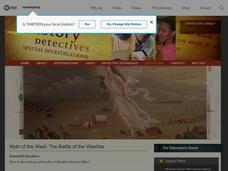DocsTeach
Comparing Urban and Rural Life in the Early 1900s
Experience a bit of what life was like at the turn of last century with images of rural and urban life. Learners consider pictures from each environment and then compare and contrast them. Activities include discussing the differences,...
PBS
Baseball: The Tenth Inning - Bases Divided
Baseball is a relatively high-interest topic through which social studies classes can explore racial prejudice in the US. Video clips provide much of the background information that groups record on their handout and then share with the...
Curated OER
Immigration and Ancestors
We are all immigrants to this country and the study of immigration can help students connect to history in a personal way. Students will listen to audio clips from the Ellis Island web site, discuss the treatment of immigrants in the...
Museum of Tolerance
Making Lemonade: Responding to Oppression in Empowering Ways
An activity focused on tolerance encourages class members to consider how they might respond when they or someone else is the target of oppression and discrimination. After researching how some key figures responded to the...
Federal Reserve Bank
Journey to Jo’burg: A South African Story
How did South African apartheid affect the ability of people of color to increase their human capital? Here is a rich lesson in which learners come to understand the relationship between investment in human capital and income, while also...
DocsTeach
Suffragist Susan B. Anthony: Petitioning for the Right to Vote
What is the best way to get a point across: a petition or a protest? Using primary sources, including a petition from Susan B. Anthony and a photo of a White House protest from the early 1900s, young historians examine what women did to...
DocsTeach
Why Did Women Want the Right to Vote?
No taxation without representation may have been the battle cry of the American Revolution, but women used the same argument when demanding their right to vote in the late 1800 and early 1900s. Young historians examine petitions from...
Smithsonian Institution
Borders and Community: Early 20th Century Chicago Neighborhoods and Ethnic Enclaves
Chicago is one city, four neighborhoods, and countless nationalities. The lesson explores the ethnic division of Chicago in the early twentieth century. Academics read primary sources, analyze maps, and tour an online exhibit to...
Smarter Balanced
Growth and Expansion of America
Despite the difficulty of travel, the US expanded significantly between the 1800s and the early 1900s. To prepare for a performance task assessment on the rapid expansion of the US in the 1800s, class members engage in a...
Curated OER
I Wonder What Malaria is
Students examine the disease malaria. They compare how diseases were spread in the early 1900's compared to how they are spread today and discuss why that is dangerous. They take a survey to see how much they know about insects that...
Curated OER
Thurgood Marshall Makes a Difference
Students find information about the life and legal career of Thurgood Marshall, including the NAACP and its causes. They comprehend the issues and context of the Brown v. Board of Education case that Marshall argued before the U.S....
Curated OER
Lewis Hine
Students are be able to analyze primary sources (photographs) of immigration during the early 1900s at Ellis Island. They are be able to identify why immigrants came to America.
Curated OER
A Children's World
Third graders investigate images of Canadian students in the late 1800's and early 1900's. They connect their lives with students of the past.
Curated OER
Comparing Ethnic Groups
Eleventh graders explore the relationship between the United States and the Native Americans from after the Civil War to the early 1900's. They evaluate the actions of the United States towards Native Americans and compare the actions to...
Curated OER
Sarita Wetland Restoration
Students collaborate on the plannng and implementation of the Sarita Wetland Restoration. The Sarita Wetland is the remnant of former Lake Sarita that was drained in the early 1900's. The goal of the entire project is to improve water...
Curated OER
Beethoven Manuscript Sold at Auction
Young scholars react to a series of statements about Beethoven, then read a news article about the sale of a 179-year-old manuscript by the musical genius. In this current events lesson, the teacher introduces the article with a...
Curated OER
The Progressive Era
Eighth graders utilize the SOAP method to analyze a work of art and relate it to what they know about the Progressive Era and the reasons why cities changed and the ways in which cities changed during the end of the 19th century. They...
NASA
Just How Far is That Star?
Pupils often wonder how we know the distance to various stars. Starting with a thought experiment and progressing to a physical experiment, they determine the brightness and distance to various stars. The evaluation requires...
Constitutional Rights Foundation
Women in the Military
Scholars analyze the role of women in the military in United States history. Using group research, debate, and diary entries, they explore various military activity in America. To complete the lesson, young historians write an essay...
PBS
Myth of the West: The Battle of the Washita
Go West, young man! Scholars use PBS video clips, slide shows, and interactive materials to create a picture of Manifest Destiny in the American West. Using a variety of primary and secondary sources, young historians learn about the...
Population Connection
A Demographically Divided World
Did you know that birth and life rates vary across the world? The resource, the second in a six-part series, discusses just how demographics differ across countries and why it might be the case. Scholars complete worksheets, watch...
ProCon
Is Homework Beneficial?
Does homework improve student achievement, or does it increase stress? Scholars use the included debate topics website to prepare for a class discussion or debate about whether homework is advantageous. After reading a brief background...
Penguin Books
The Jungle
It's a jungle out there! Teachers gain information to guide learners through reading The Jungle by Upton Sinclair. Instructors give an overview of the characters in the story and a summary of each chapter. The resource includes questions...
Marybeth Lobiecki
Beyond Baseball with Jackie Robinson
Jackie Robinson was more than a baseball star, he was a prominent activist. The thought-provoking resource focuses on the life and achievements of Jackie Robinson, from his baseball career to his civic participation. Academics listen and...
Other popular searches
- Child Labor 1900s
- 1900s Artists
- 1900s Art
- United States History 1900's
- Early 1900s
- Russian Revolution 1900's
- Jim Crow Laws 1900s
- Child Labor Laws 1900s
- Early 1900's Catalog
- Facts Child Labor 1900s
- Early 1900's
- Emigration 1900s



